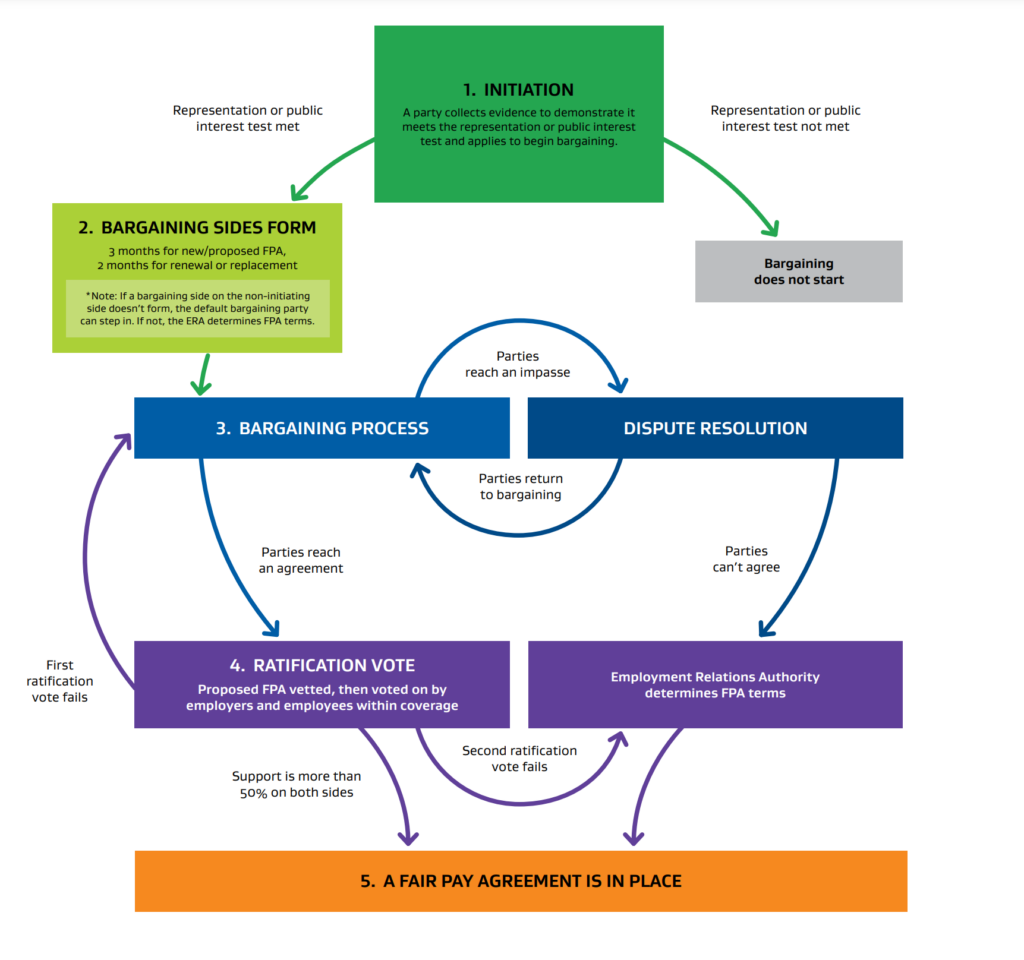UPDATE: 15 December, 2023
The Bill to repeal Fair Pay Agreements is being finalised
A Bill to repeal the Fair Pay Agreements Act has passed its final reading in Parliament and will pass through Royal Assent today, meaning it will essentially come into effect immediately. The repeal removes the bargaining framework that enables unions and employer associations to bargain fair pay agreements. As no Fair Pay Agreements have been finalised, the impact will be to remove the ability for any FPAs to be finalised. This change will not affect current employment terms.
Jump to:
- Is there an FPA for hospitality?
- What are FPA’s
- How does bargaining get initiated?
- The bargaining process
- Restaurant Association position on FPA’s
- Frequently Asked Questions
- How can you have your say on Fair Pay Agreements?
Find out more about the FPA system, prior to the legislation being repealed, below.
The Fair Pay Agreements (FPA) system in New Zealand brings together unions and employer associations within a sector to bargain for minimum employment terms for all covered employees – either in an industry, or an occupation.
On 29 May 2023, MBIE approved the Union’s application to initiate Fair Pay Agreement bargaining for the hospitality industry. This means moving towards the next step where hospitality employers (represented- by the Restaurant Association and other Associations) and hospitality employees (represented by the Union) will begin negotiations on what minimum terms will be included in a FPA.
Is there an FPA for the hospitality industry?
Since 1 December 2022, representative bodies – eligible Unions – became able to apply to initiate bargaining for a Fair Pay Agreement. Unite Union applied to MBIE to initiate bargaining for a Fair Pay Agreement for the Hospitality sector on 1 December and this application was approved by MBIE on 30 May, 2023.
Explainer Webinar – Member Resource

What are FPAs?
The Fair Pay Agreements (FPA) Act was passed into law on 26 October and the Fair Pay Agreement system came into effect as of 1 December 2022. FPA’s are legally-binding agreements that set out minimum pay and conditions between employers and employees across an entire sector. Mandatory inclusions in an FPA, include:
- when the FPA comes into force and expires (an FPA must apply for no less than three years, but no more than five years)
- its coverage
- the normal hours of work
- minimum base wage rates
- overtime penalty rates
- any superannuation entitlements
How does Fair Pay bargaining get initiated?
If 1,000 workers in an industry or an occupation, or 10% of their workforce (whichever is smaller) demand a Fair Payment Agreement, then an eligible Union can apply to MBIE to initiate bargaining for a proposed Fair Pay Agreement. Hospitality was the first sector for which an application for Fair Pay Agreement bargaining was initiated when the Union made an application on 1 December, 2022.
At the stage of an application being made:
- The application is reviewed and assessed against the legal requirements by MBIE. They will also go through a verification process to check that the threshold used to initiate the application (either 1,000 workers, or 10% of the workforce) has been met.
- If approved, MBIE will publicly notify that it has approved the application and will publish details. negotiations begin between employers / employer representatives and unions.
- Once a union has been given approval to start bargaining, within 15 working days of receiving the approval, the initiating union must use its best efforts to identify and notify in writing:
- all unions that have members that it considers are likely to be covered employees and
- all employers that it considers are likely to have covered employees in the occupation or industry that the proposed Fair Pay Agreement relates to (and provide an email address to which they must send their covered employees contact details).
The FPA bargaining process
Fair Pay Agreement bargaining is made up of employee and employer representatives.
- The employer bargaining side is made up of one or more eligible employer associations, like the Restaurant Association, that are approved to be an employer bargaining party.
- The Restaurant Association was approved to be an employer bargaining party on 26 June, 2023. There are 9 employer bargaining parties – find out more here.
- The employee bargaining side is made up of one or more eligible unions who are approved to be an employee bargaining party.
Please note, both the employer and employee bargaining sides must bargain for both employees and employers that are, and are not, members of their organisations.

Through the bargaining process, unions and employers attempt to reach an agreement on the minimum terms and conditions to be included in an FPA. That will then go to a vote – and needs more than half of workers and more than half of employers’ votes to be in favour. If bargaining reaches an impasse, or a deal is twice rejected by either workers or employers, then the Employment Relations Authority will step in and set the minimum terms and conditions itself.
MBIE will still need to approve each agreement and bring it into force through regulations.
The First Set of Regulations have been passed and a second set of regulations will be passed in 2023. These regulations can be found here: Fair Pay Agreements Regulations, covering:
- Details for the public interest test criteria
- Evidence required by MBIE to satisfy the representation test
- Requirement for how parties need to define coverage
- Who the voluntary default bargaining parties are under the FPA system
Once a Fair Pay Agreement is in place
Once a Fair Pay Agreement is passed into law, the employment terms of the Fair Pay Agreement apply to any employee where 25% or more of their work is covered by the agreement. In addition, if an employee is covered by more than one Fair Pay Agreement, the agreement that covers the greater percentage of their work applies. This is so that only one Fair Pay Agreement will apply to a particular employee.
Fair Pay Agreements set minimum employment terms for covered employees. If an employment term in an Individual Employment Agreement or Collective Employment Agreement is better than the term in a Fair Pay Agreement, then that term will apply. If the Fair Pay Agreement term is better, the Fair Pay Agreement term will apply.
Restaurant Association position on FPA’s
We did not support the Fair Pay Agreement legislation, however, we want to ensure that it is clear that the Association supports fair working conditions and as the representing body of most of the restaurants and cafes in New Zealand we provide support for our members in achieving this.
We have always supported fair pay and appropriate working conditions and long done so without the compulsive force of the law.

We currently operate in an environment with extremely robust minimum standards in place, that provides wide-ranging protection for employees. Low unemployment and minimum wage levels that are already one of the highest in the OECD provide incentive for employers to put their best foot forward with regards to pay and conditions.
Having said that, the Association aims to ensure that we will be at the bargaining table of any negotiations around Fair Pay Agreements for hospitality and will be providing input from consultation with members.
Frequently Asked Questions
Unite have sent out a letter giving employers notice of a meeting to be held on 15th September 2023. The meetings are scheduled for 12 pm and then another one at 2pm.
The notification states that your employees should go to one of these meetings – All covered employees are entitled to attend these paid meetings, whether they are members of a union or not.
The Union will confirm via email the names of all your employees who attended the meeting by Monday 18th September.
Your employees must be on ordinary pay to the extent that the employee would otherwise be working for the employer during the meeting. This is for 2 hours.
The process can’t be rushed. The union will still have to organise these meetings across all of Aotearoa for the next 6 weeks. We then have to negotiate any terms proposed.
There will be more meetings over the next few months, including online. The union will send out further communication about these alternative dates.
Your obligation as the employer is to let the employee know about the meetings. It is the decision of the employee to attend or not.
They will most likely discuss what the employees want to improve; it could be pay, leave, breaks, rosters, health & safety, annual leave, weekend rates etc.
We reached out to Unite immediately following their email communication. We expressed our concern around the date and times chosen and that there was no prior consultation with any industry experts before picking a date that would be suitable to our Hospo businesses. We requested that they speak to us and to also provide further dates and times that would be more suitable.Note that it is not a requirement under the legislation for the union to consult with anyone about this process. However, we wanted to make sure that we communicate our concerns with the union.
How can you have your say on Fair Pay Agreements?
The Restaurant Association is committed to representing hospitality employer’s voices in the bargaining process. Here are some of the ways you can ensure you have your say:
- Sign up to receive updates on the Fair Pay Agreement process
- Contact us with feedback at any time on 0800 737 827, or email info@restaurantnz.co.nz
- Take part in any surveys we run asking for industry feedback (sign up to receive updates and we’ll automatically send you a link to surveys when they are running
- Arrange for one of our friendly team to visit you – our team covers the country and here to discuss any concerns or feedback that you may have. Email info@restaurantnz.co.nz and we’ll get you in touch with our local RA team member
We will keep you up to date now that the implementation of the Fair Pay Agreements legislation is underway. MBIE also has a Fair Pay Agreements Dashboard here – which tracks the progress of proposed FPAs as they progress through the FPA system.
